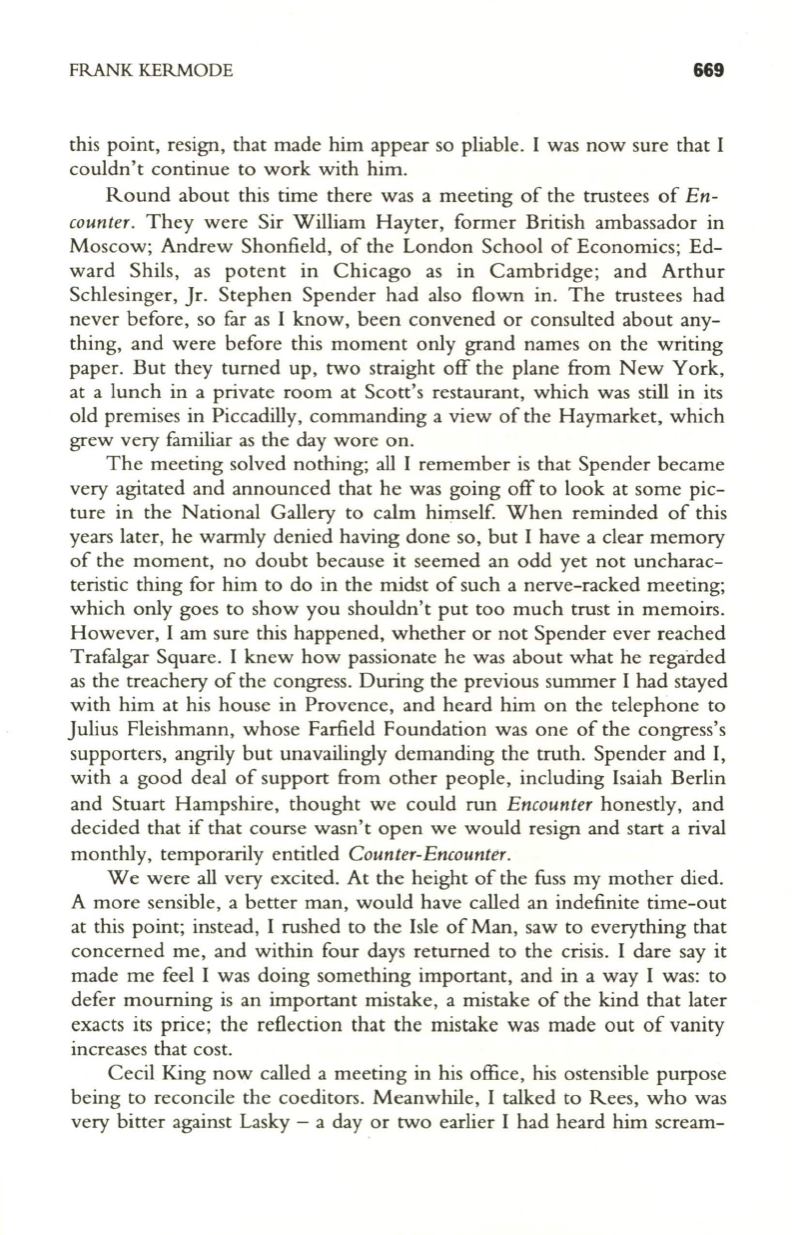
FRANK KERMODE
669
this point, resign, that made him appear so pliable. I was now sure that I
couldn't continue to work with him.
Round about this time there was a meeting of the trustees of
En–
counter.
They were Sir William Hayter, former British ambassador in
Moscow; Andrew Shonfield, of the London School of Economics; Ed–
ward Shils, as potent in Chicago as in Cambridge; and Arthur
Schlesinger, Jr. Stephen Spender had also flown in. The trustees had
never before, so far as I know, been convened or consulted about any–
thing, and were before this moment only grand names on the writing
paper. But they turned up, two straight off the plane from New York,
at a lunch in a private room at Scott's restaurant, which was still in its
old premises in Piccadilly, commanding a view of the Haymarket, which
grew very familiar as the day wore on.
The meeting solved nothing; all I remember is that Spender became
very agitated and announced that he was going off to look at some pic–
ture in the National Gallery to calm himself When reminded of this
years later, he warmly denied having done so, but I have a clear memory
of the moment, no doubt because it seemed an odd yet not uncharac–
teristic thing for him to do in the midst of such a nerve-racked meeting;
which only goes to show you shouldn't put too much trust in memoirs.
However, I am sure this happened, whether or not Spender ever reached
Trafalgar Square. I knew how passionate he was about what he regarded
as the treachery of the congress. During the previous summer I had stayed
with him at his house in Provence, and heard him on the telephone to
Julius Fleishmann, whose Farfield Foundation was one of the congress's
supporters, angrily but unavailingly demanding the truth. Spender and
I,
with a good deal of support from other people, including Isaiah Berlin
and Stuart Hampshire, thought we could run
Encounter
honestly, and
decided that if that course wasn't open we would resign and start a rival
monthly, temporarily entitled
Counter-Encounter.
We were all very excited. At the height of the fuss my mother died.
A more sensible, a better man, would have called an indefinite time-out
at this point; instead, I rushed to the Isle of Man, saw to everything that
concerned me, and within four days returned to the crisis. I dare say it
made me feel I was doing something important, and in a way I was: to
defer mourning is an important mistake, a mistake of the kind that later
exacts its price; the reflection that the mistake was made out of vanity
increases that cost.
Cecil King now called a meeting in his office, his ostensible purpose
being to reconcile the coeditors. Meanwhile, I talked to Rees, who was
very bitter against Lasky - a day or two earlier I had heard him scream-


